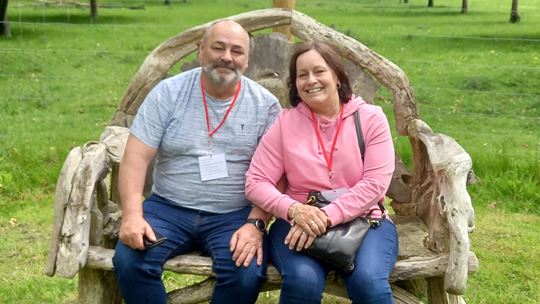10 Positive Behaviour Strategies in Foster Care
It’s a good idea to learn some of the best strategies for dealing with challenging behaviour before you foster. Discover our top 10 positive behaviour management strategies for children in foster care.

Foster parents may have to deal with challenging behaviour from time to time. Often, it’s just your typical temper tantrums and teenager behaviour, but sometimes it may be linked to past traumatic experiences, which can manifest in how they act. Some might be more reclusive, whereas others might push boundaries.
As a foster parent, you need to know how to manage these behaviours with positive behaviour strategies alongside bucket loads of empathy. By doing so, you can provide your foster child with a more stable and supportive home. But don’t worry, you won’t be alone. With Foserplus, we provide a wide range of behaviour support for children so you can help manage and communicate their emotions better, and ultimately lead happier lives.
Understanding Children’s Behaviour – Advice for Foster Parents
Children’s behaviour is often a result of their past. Understanding where it comes from is the first step to encouraging more positive behaviour. Some young children go through things no one ever should, and they need a positive role model to help them enjoy a better childhood. You can be that person, but it requires knowing how to handle poor behaviour.

What Are Positive Behaviour Strategies?
Positive behaviour management strategies are techniques to help encourage good behaviour. Rather than focusing on punishment and discipline, though, it’s about focusing on the positive side. Being a foster parent is a lot like being a teacher. Your foster care training can help you develop the skills you need to care for children and young people going through a rough time.
Every child is unique though, and some might need a little more attention than others. For example with emergency foster care, a child may come to you frightened, anxious, angry or completely shut down. As a foster parent, you’ll need to build a trusting relationship in a short space of time to help them come down from their heightened state. If you do emergency fostering, though, you will receive adequate training beforehand. Plus, you get to know you are helping some of the most vulnerable young people. Being a great foster parent truly makes a difference.
Top 10 Behaviour Management Techniques for Challenging Behaviour
It’s a good idea to learn some of the best strategies for dealing with challenging behaviour before you foster. By doing so, you ensure you provide the best experience possible for your foster child. It’s not just about making foster parenting easier on you (although that is part of it) - it’s also about giving your foster child the best chance at life. To help you do that, here are 10 child behaviour management strategies to help you become a better foster parent.
Positive Language
Focusing on the negative will only make way for more challenging behaviour. If you constantly shout and discipline your foster child, you create an environment of negativity, which is to be avoided. That doesn’t mean your foster child should never face the consequences – just that you should focus more on when they display positive behaviour.
Use positive language day-to-day to encourage more of the same. This will teach them that good behaviour creates a happier atmosphere, and they are likely to do more of the same. Remember – words are important, so choose yours carefully when talking with your foster child.
Consistency
To promote positive behaviour at home, you need to be consistent with your behaviour management techniques. Don’t try one technique one day and then a wildly different one the next. If you do that, your foster child will feel unstable and won’t know what to expect from you.
Decide which behaviour management techniques you will use beforehand and stick to them. Be consistent, and your foster child will feel more comfortable in your care.Time Outs
Too much stimulation can encourage temper tantrums. Time outs are essential when your foster child is frustrated, angry, or upset. Have a quiet, safe space in your home for them to go to when it all gets too much. It’s not all about discipline – it’s about ensuring they have a space for themselves when they are overwhelmed.
Time outs are important for adults, too. If you feel you need a break, respite foster care is available and will provide you with that all-important chance to rest and recharge. It’s OK to admit you need a breather from time to time! After all, foster parenting is not always a breeze.
Rewards Chart
Rewarding good behaviour is more important than discipline most of the time. Don’t fall into the trap of focusing on the negatives. Instead, pay attention to good behaviour and keep a rewards chart to document it. For example, every time your foster child has behaved well, you could add a sticker. Once they accumulate ten stickers, you could treat them to something they want. That might be a trip out, or perhaps a gift. You could even have a separate chart for their school year, adding a sticker every time they have a good day in school. The small wins add up to big changes.
This child behaviour management technique works because it encourages your child to keep behaving well. They will see that acting positively equals a positive outcome.
Active Listening
Children need to be listened to, and most importantly, heard. Especially if they have been through traumatic experiences. Make time to actively listen to your child. Let them speak, listen to what they say, and offer your guidance when necessary.
Active listening can be tricky sometimes, especially as a busy parent, but you must take time out of your day to sit down and hear what your foster child is feeling.Words of Praise
A rewards chart is excellent for encouraging better behaviour, but you don’t have to hand over a gift every time your child remembers to say please and thank you. Instead, offer plenty of words of praise. Take notice of when they behave well and tell them well done. You shouldn’t underestimate the power of positive language!
Routine and Stability
Children and young people in foster care are much more likely to experience poor mental health because of what they have been through. Often, they don’t even understand what it is like to have a stable home, and their early experiences can cause significant issues in their development. As a foster parent, you should provide a stable home with a fixed routine to help them adjust.
A routine will help them trust you and their surroundings, which will encourage better behaviour. If they have a set routine, they are less likely to act up. It’s all about stability.
Choose the Battles
You might think that behaviour management techniques for challenging behaviour always include discipline. That’s not the case, though. You don’t have to go straight to discipline every time your child acts up. In these situations, it is always better to stay calm and pick your battles. Otherwise, both you and your foster child will become even more stressed.
The teenage years are notorious for challenging behaviour. You might have to deal with poor behaviour like skipping school or talking back. Sometimes, it is better to let some things go. You can’t expect perfection all the time, after all. If your foster child is acting up more often than not, then it’s crucial to talk to your child to gain an insight into the reasons why.
Family Rules List
Rules are important for kids to have. Your family rules list doesn’t have to be excessive – just a couple of focused rules will help. The rules will differ depending on the child's age and the way they behave. A pre-teen won’t follow the same rules as a toddler or a 17-year-old. Some rules you could use include:
- No climbing on furniture
- Zero violence
- Clean up after yourself
- Always tell the truth
- No sweet treats until after dinner
Don’t forget to include that they should behave at school, too. If their student behaviour is poor, you should discuss this with them to understand how you can make school a better experience for them. After all, school is a crucial part of development, both educationally and socially. Speak to their teachers if you have any concerns about their school life. The more involved you are, the better.
You must also make sure everyone in the household follows the same rules. If you have biological children of the same age, don’t give them a different set of rules. You want every child to feel equally loved and part of your family. Where appropriate, make sure that you follow the same rules, too. For example, if one of the rules is to always clean up after yourself, make sure you do the same! Otherwise, the rules are unfair.
Be a Great Role Model
One of the best things you can do for your foster child is to be an excellent role model. It’s not always easy to do, especially when you have a lot on your plate, but it’s crucial to monitor your behaviour as much as your kids. Being a kind, caring, and strong foster parent will encourage them to be like you.Many foster kids haven’t had a good role model in their life. You might even be the first adult that they can look up to. Take that responsibility seriously by acting like someone you’d like them to grow into.
These children and teenage behaviour management strategies should make life as a foster parent a lot easier. It will also ensure you encourage your foster child to grow into the best possible version of themselves. Setting rules, providing a stable home and family, and being a great role model will help them get on the right track.
Can't find what you're looking for?
By phone
One of our team is available to talk to you over the phone to answer any of your fostering queries.
Enquire online
You can get in touch by filling out our online enquiry form with any queries that you may have.
Your local team
Find contact details for your local office team. We’re always happy for you to pop-in and chat.





